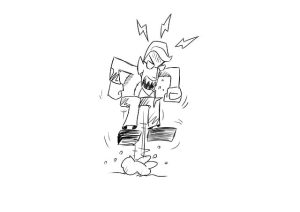Anger control therapy is a comprehensive approach to managing aggressive behavior, addressing its complex causes like past trauma and emotional regulation difficulties. It employs techniques such as cognitive-behavioral therapy (CBT), mindfulness practices, and social skills training to empower individuals with healthier coping mechanisms and improved emotional intelligence. By modifying negative thought patterns, enhancing self-awareness, and teaching effective communication, this therapy reduces impulsive aggression and fosters better relationships and mental health. Success stories highlight its ability to transform lives previously marked by violent outbursts into more constructive, peaceful ones.
Aggressive behavior can have profound impacts on individuals and relationships. This comprehensive guide explores effective strategies for managing aggression, focusing on anger control therapy. We delve into the underlying causes and triggers, from psychological factors to environmental influences. Discover a range of techniques, including cognitive behavioral therapy (CBT), mindfulness practices, family therapy, and lifestyle adjustments. Learn how these approaches help individuals gain control, foster healthier emotions, and lead more fulfilling lives through successful therapy stories.
Understanding Aggressive Behavior: Causes and Triggers

Aggressive behavior is a complex issue that can stem from various underlying causes, making it crucial to understand these triggers in order to effectively address and manage them. Anger control therapy, for instance, often delves into the root causes of aggression, which can include past traumatic experiences, emotional regulation difficulties, or even environmental factors like stress or abuse. By identifying these triggers, individuals can gain valuable insights into why they react aggressively and develop healthier coping mechanisms.
Many times, aggressive behavior is a defense mechanism that arises from a person’s inability to express or manage their emotions effectively. This could be due to lack of social skills, poor problem-solving abilities, or even certain mental health conditions. Recognizing these patterns and learning alternative ways to respond can help individuals break free from the cycle of aggression and embrace more constructive behaviors.
The Role of Anger in Aggressive Outbursts

Anger, a natural and normal human emotion, can be a significant contributor to aggressive behavior. When individuals struggle to manage their anger effectively, it often manifests as outbursts that can range from verbal assaults to physical aggression. Anger control therapy is a specialized form of counseling designed to help individuals understand and regulate their anger. Through this therapy, individuals learn strategies to identify triggers, manage intense emotions, and respond constructively rather than impulsively.
By addressing underlying issues such as past traumas, unmet needs, or unhealthy coping mechanisms, anger control therapy enables individuals to develop healthier ways of expressing and channeling their anger. This can lead to improved relationships, better overall mental health, and a significant reduction in aggressive outbursts. The ultimate goal is to foster emotional intelligence and resilience, allowing individuals to navigate challenging situations with calmness and composure.
Common Techniques in Anger Control Therapy

Anger control therapy employs various techniques tailored to help individuals manage and reduce aggressive behavior. Cognitive-behavioral therapy (CBT) is a common approach, focusing on identifying and changing negative thought patterns and behaviors associated with anger. This involves learning to recognize triggers, understanding emotional responses, and developing healthier coping mechanisms. For instance, patients might be taught relaxation strategies, such as deep breathing exercises, to help calm down when faced with irritating situations.
Another effective method is mindfulness-based therapy, which encourages individuals to stay present and aware of their anger without judgment. This practice allows people to observe their emotions and physical sensations, enabling them to respond more thoughtfully rather than reacting impulsively. Additionally, social skills training can enhance communication and problem-solving abilities, providing alternative ways to express frustration constructively. These techniques collectively offer valuable tools for managing anger, ultimately leading to improved relationships and a reduced risk of aggressive outbursts.
Cognitive Behavioral Therapy (CBT): A Step-by-Step Approach

Cognitive Behavioral Therapy (CBT) is a structured and evidence-based approach to treating aggressive behavior, focusing on identifying and modifying negative thought patterns and behaviors. The process typically involves several steps. First, the therapist helps the individual recognize triggers for aggression and understand the connection between thoughts, feelings, and actions. This involves keeping a mood journal to track instances of aggression and associated thoughts.
Once these patterns are identified, CBT focuses on challenging and changing unhelpful cognitive distortions. Through techniques like cognitive restructuring, individuals learn to replace negative thought cycles with more balanced and realistic perspectives. Concurrently, behavior modification strategies, such as anger management skills training, teach practical ways to cope with triggers and reduce impulsive reactions. The goal is to empower individuals with effective tools for managing their anger and responding to challenging situations in healthier, less aggressive manners.
Mindfulness and Meditation for Anger Management

Mindfulness and meditation are powerful tools within anger control therapy, offering individuals a way to navigate and manage intense emotions effectively. By focusing on the present moment and cultivating awareness, individuals can learn to observe their thoughts and feelings without judgment. This practice is particularly beneficial for aggressive behavior as it helps to reduce impulsive reactions. Through regular mindfulness exercises, one can develop a greater sense of self-control, enabling them to respond rather than react when confronted with anger-triggering situations.
Meditation techniques allow individuals to explore the underlying causes of their aggression and develop healthier coping strategies. It encourages a deeper understanding of emotional triggers and promotes relaxation, thereby reducing the intensity of angry feelings. By integrating mindfulness into daily routines, individuals can enhance their ability to stay calm under pressure and make more thoughtful decisions, ultimately leading to improved anger management skills.
Exploring the Roots: Family Therapy and Support Systems

Understanding the underlying causes is crucial in addressing aggressive behavior. Family therapy emerges as a powerful tool in exploring these roots, especially for individuals struggling with anger control issues. By bringing together family members, therapists can create a safe space to uncover and resolve conflicts, improve communication patterns, and enhance emotional support systems. This collaborative approach not only helps the individual but also strengthens the familial bond, fostering an environment conducive to positive behavior change.
The support system plays a pivotal role in therapy for aggressive behavior. Family members or caregivers who understand and actively participate in the process can significantly contribute to the success of anger control therapy. They learn effective coping strategies, communication techniques, and conflict resolution skills, enabling them to offer continuous encouragement and guidance outside of therapeutic sessions. This collective effort ensures that the individual receives holistic support, promoting sustainable behavioral modification.
Lifestyle Changes for Better Emotional Regulation

Many individuals struggling with aggressive behavior seek anger control therapy, recognizing that their actions stem from underlying emotional issues. Lifestyle changes play a crucial role in this process. One significant shift involves adopting healthier coping mechanisms to manage stress and anger instead of resorting to aggression. This may include incorporating regular physical activity, as exercise has been shown to reduce tension and improve mood. Additionally, mindfulness practices like meditation or deep breathing exercises can help individuals recognize and control their emotional responses.
Diet and sleep also contribute to emotional regulation. A balanced diet rich in nutrients supports overall well-being, while consistent sleep patterns stabilize mood. Further, practicing good time management and setting realistic goals can decrease feelings of overwhelm and frustration, which are common triggers for aggressive behavior. These lifestyle adjustments, combined with anger control therapy techniques, empower individuals to respond calmly in challenging situations.
Medication and Its Place in Aggressive Behavior Treatment

Medication plays a significant yet often overlooked role in treating aggressive behavior and is an essential tool alongside therapy, particularly anger control therapy. While therapy addresses the underlying causes and provides strategies to manage emotions, medication can help regulate brain chemistry and reduce symptoms of aggression. For many individuals, a combination of these two approaches offers the best chance at long-term success.
Prescribed medications can include mood stabilizers, anti-depressants, or anti-psychotic drugs, each tailored to the individual’s specific needs. These pharmaceuticals work to balance neurotransmitters in the brain, like serotonin and dopamine, which are linked to aggression and impulsivity. By managing these chemical imbalances, medication can help individuals gain better control over their temper and impulsive reactions, making them more receptive to learning new coping skills through therapy.
Success Stories: Real-Life Examples of Effective Therapy

In the journey towards managing aggressive behavior, numerous success stories emerge from individuals who have found transformative solutions through specialized therapy. Anger control therapy, for instance, has proven effective in helping people cope with their anger and channel it constructively. Real-life examples include individuals who once struggled with violent outbursts, frequently engaging in physical altercations or verbal abuse. Through a combination of cognitive behavioral therapy (CBT), mindfulness training, and relaxation techniques taught during anger control therapy sessions, these individuals learned to recognize triggers, manage their emotions, and respond calmly.
One such success story involves a young man who had a history of becoming aggressive whenever he felt frustrated or disappointed. With the guidance of a compassionate therapist, he began to understand the underlying causes of his behavior and developed healthy coping mechanisms. Over time, he became more aware of his emotional responses, allowing him to pause, take deep breaths, and make thoughtful decisions rather than reacting impulsively. This transformation not only improved his relationships but also enhanced his overall quality of life. Such inspiring narratives underscore the power of therapy in addressing aggressive behavior and offer hope for those seeking positive change.
